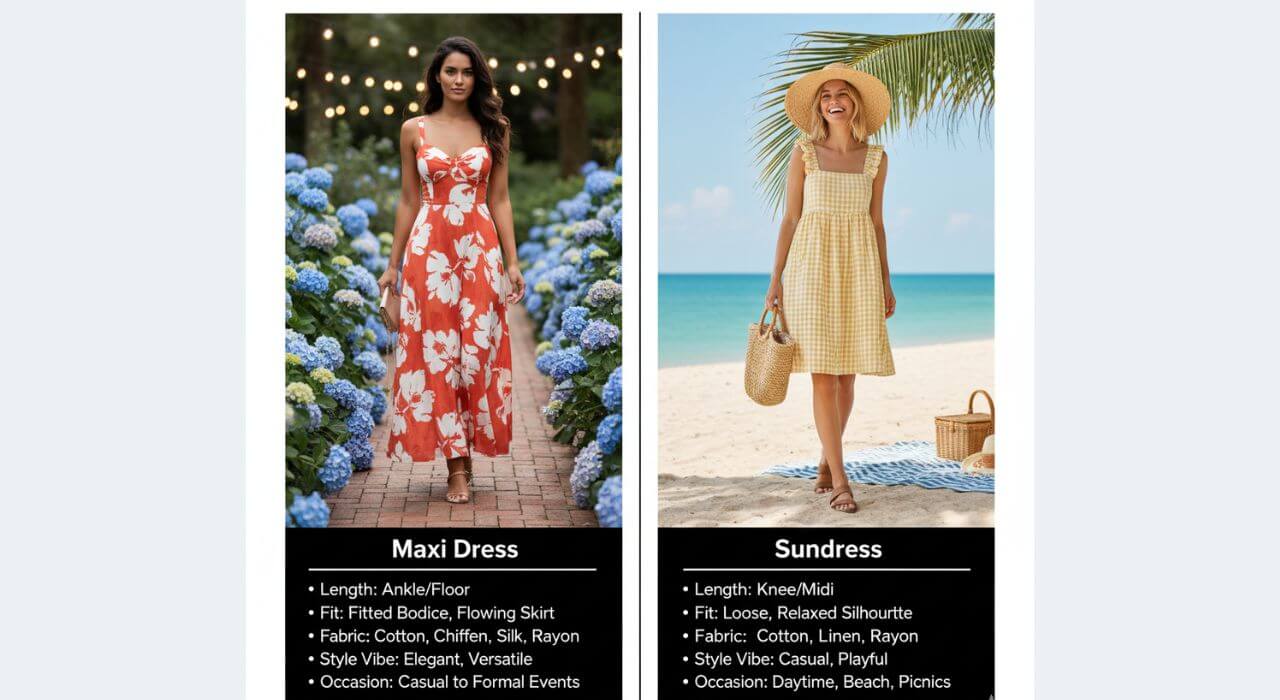Summer is the season of effortless style, and few wardrobe staples are as versatile as a flowing dress. But when it comes to choosing the right style, many people wonder: what is the difference between a maxi dress and a sundress?
While both are comfortable and stylish, they have distinct characteristics, fabrics, and occasions for which they shine. This guide breaks down everything you need to know — from silhouette and fabric to styling tips and common myths — so you can confidently pick the perfect dress every time.
What Is a Maxi Dress?
A maxi dress is a long, flowing dress that usually reaches the ankles or floor. Known for its elegance and versatility, it can transition seamlessly from casual daytime wear to evening events.
Key features of a maxi dress:
- Length: Ankle or floor-grazing
- Fabric: Cotton, chiffon, jersey, satin, or other flowing materials
- Style: Can be fitted at the top with a flowing skirt, wrap style, or empire waist
- Occasion: From casual outings to semi-formal events
Why it’s popular: Maxi dresses offer a flattering silhouette for all body types, provide comfort without sacrificing style, and can be accessorized to fit any occasion.
What Is a Sundress?
A sundress is a lightweight, breezy dress designed for warm-weather wear. Typically sleeveless or featuring thin straps, sundresses are casual, easy-to-wear, and perfect for relaxed summer outings.
Key features of a sundress:
- Length: Usually knee-length or midi (some maxi variations exist)
- Fabric: Lightweight materials like cotton, linen, or rayon
- Style: Loose, airy, and comfortable
- Occasion: Daytime events, picnics, beach trips, or casual errands
Why it’s popular: Sundresses are all about comfort and effortless style, keeping you cool and fashionable during hot days.
Maxi Dress vs. Sundress: Side-by-Side Comparison
| Feature | Maxi Dress | Sundress |
|---|---|---|
| Length | Ankle or floor | Usually knee to mid-calf |
| Fit | Fitted bodice with flowing skirt | Loose, relaxed silhouette |
| Fabric | Cotton, chiffon, jersey, satin | Cotton, linen, rayon |
| Style vibe | Elegant, versatile | Casual, playful, breezy |
| Occasion | Casual to semi-formal events | Daytime, beach, picnics, casual outings |
| Necklines & Sleeves | Can have sleeves, halter, V-neck | Usually sleeveless or thin straps |
| Season | Year-round | Primarily warm weather |
| Accessories | Belts, jackets, statement jewelry | Sandals, hats, light layering |
| Overlap | Can be dressed down for casual | Can be styled longer (maxi sundress) |
Note: Some dresses blur the line, like the maxi sundress, which combines the length of a maxi with the lightweight breeziness of a sundress.
How to Choose Between a Maxi Dress and a Sundress
Consider these factors to pick the dress that fits your occasion and personal style:
- Occasion: Maxi dresses are great for semi-formal dinners or travel, while sundresses are ideal for casual, relaxed settings.
- Comfort & Fabric: Choose light fabrics like cotton or linen for warm weather; opt for flowing materials for longer lengths.
- Body Type & Silhouette: Maxi dresses elongate the frame, sundresses offer freedom and ease of movement.
- Climate: For hot and humid conditions, a sundress may be more comfortable. Maxi dresses are versatile for cooler evenings.
- Styling Preferences: If you enjoy accessorizing with belts, jackets, or heels, a maxi offers more versatility. Sundresses are effortless on their own.
Styling Tips
Maxi Dress Styling
- Daytime: Pair a floral maxi with flat sandals and a tote for a casual, chic look.
- Evening: Elevate with heels, statement jewelry, and a clutch.
- Accessory tip: Add a belt to define your waist or layer with a light jacket.
Sundress Styling
- Casual Day Out: Combine with sneakers or sandals and a sunhat.
- Vacation Look: Tropical prints with espadrilles and a straw bag.
- Layering: Throw on a denim jacket for slightly cooler days.
Hybrid Styling
The maxi sundress blends the airy feel of a sundress with the length of a maxi. Perfect for transitional weather or casual evenings — style with wedges and simple jewelry for a versatile outfit.
Common Myths and Mistakes
-
Myth 1: Sundresses must be short.
➡️ Many sundresses come in midi or even maxi lengths. -
Myth 2: Maxi dresses are only for formal events.
➡️ With casual fabrics like cotton or jersey, they are perfect for daytime wear too. -
Mistake 1: Ignoring fabric and weather — heavy fabrics in summer are uncomfortable.
-
Mistake 2: Choosing the wrong length — too long may drag; too short may lose the elegant flow.
-
Mistake 3: Overlooking accessories — belts, shoes, and layering can transform the outfit completely.
Checklist for Buying the Perfect Dress
Maxi Dress
- Choose a length that flatters your height
- Opt for breathable, flowing fabrics
- Consider waist-defining styles like wrap or empire
- Check lining for opacity and comfort
Sundress
- Pick lightweight fabrics for summer
- Ensure straps and neckline are comfortable
- Midi or knee-length options work for versatile styling
- Select patterns or colors that suit your personal style
Pro Tip: Sustainable fabrics like organic cotton, bamboo rayon, or recycled blends are stylish and eco-friendly.
Conclusion
Both maxi dresses and sundresses are essential wardrobe staples, each with its unique charm. The maxi dress brings elegance and versatility, while the sundress offers breezy comfort and playful style.
When choosing between the two, consider your occasion, comfort, personal style, and climate. Mix both in your wardrobe for ultimate summer flexibility and style.

